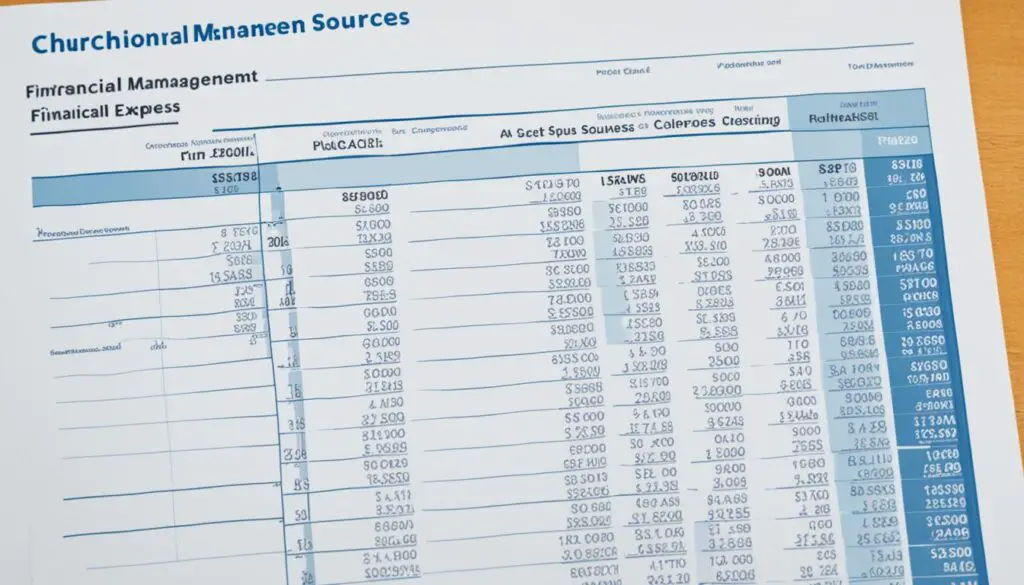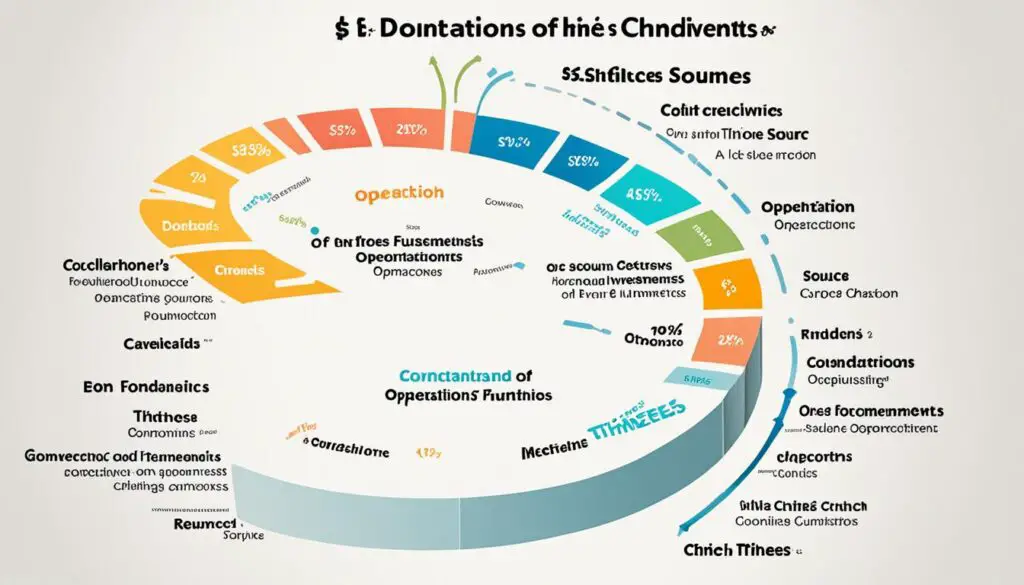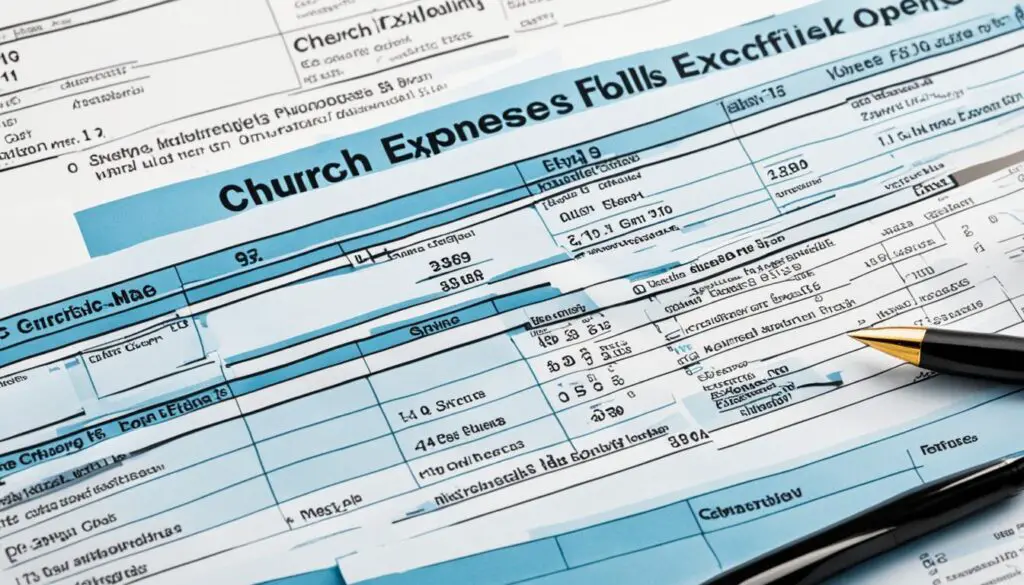Ever thought about how churches cover their costs? This is a key question for many who care about their church. As someone deeply involved in my church, I’ve experienced how managing money affects our work.
Churches need money to do their work. This includes spreading their message, helping their members, and giving back to the community. Money is also needed for building upkeep, salaries, and programs. How churches manage their money impacts what they can do.
Our church leaders work hard to use money wisely. They budget carefully to make the most of what we have. This lets us support more people and build a strong church family.
Key Takeaways:
- Churches rely on financial resources to support their ministries and serve their communities.
- Responsible stewardship and strategic financial management are crucial in maximizing the impact of church finances.
- The way churches handle their budgeting directly affects the scope and effectiveness of their ministries.
- Proper financial management allows churches to extend their reach and support charitable initiatives.
- By prioritizing wise financial practices, churches can make a lasting impact on individuals and communities.
Biblical Definition of Church Finances
The Bible doesn’t give a strict definition of church finances. It focuses on managing money well and being generous. We see the idea of tithing, which is giving a tenth of your income to the church, in both the Old and New Testaments. The apostle Paul tells Christians to give a lot. The Bible doesn’t give step-by-step money tips for churches. It does stress the need to handle money carefully and the key role money plays in supporting the church’s work.
Relevant Bible Verses about Church Finances
The Bible offers tips and wisdom for many life areas, including managing church money. It talks about giving, taking care of what’s given, and the good things that happen when you help your church.
Malachi 3:10 tells us to put our tithes in the church’s bank. This shows the importance of giving part of our money. Doing this helps our church and its goals.
In 2 Corinthians 9:7, we learn to give with joy and plenty. It tells us to share our good fortune happily. Then, besides helping the church, we enjoy giving.
Luke 6:38 talks about giving back what we give, but more. Jesus says we get back more than we give. This shows that helping the church brings blessings.
“Give, and it will be given to you: good measure, pressed down, shaken together, and running over will be put into your bosom. For with the same measure that you use, it will be measured back to you.” – Luke 6:38
These Bible verses remind us about church finance basics. They encourage us to give, take good care, and trust God for more. By giving wisely, we help the church and see the good results.
Examples of Church Finances in the Bible
The Bible shows church finances in many ways. It talks about how money helps do church work and helps the community.
Example 1: The Tabernacle in the Old Testament
In the Old Testament, the Israelites gave to the tabernacle. They brought gold, silver, and more for it. Their help made a place to worship and find God’s presence.
Example 2: The Early Church in the New Testament
The early church in Acts 4:32-37 is a great model of sharing. They sold things to help everyone. This caring way helped the church support its people and its mission well.
These stories show church money is about caring for others. It’s about looking after the church and the community. It shows how much the church wants to help and follow God.
“Do not neglect to do good and to share what you have, for such sacrifices are pleasing to God.” – Hebrews 13:16
| Examples | Context |
|---|---|
| Tabernacle | Old Testament – Exodus 35-36 |
| Early Church | New Testament – Acts 4:32-37 |

Lessons from Church Finances in the Bible
The Bible gives us great lessons on church money. It shows us how to manage, give, and trust God to provide. The key lesson is tithing, or giving a part of what we earn to help the church. This helps our churches grow and stay strong.
“Each of you should give what you have decided in your heart to give, not reluctantly or under compulsion, for God loves a cheerful giver.” – 2 Corinthians 9:7
The Bible also teaches about sharing in the church’s early days. Acts 4:32-37 shares how believers shared what they had. They made sure everyone’s needs were met. This shows the power of unity and caring in a church family.
God wants us to manage church money well. This means being careful with the funds He gives us. We should handle church money with honesty and skill. This makes sure the church’s work is done the right way.
Church finances are more than just dollars and cents. They show our love and trust in God. By giving, managing wisely, and being honest, we can help our churches grow. Let’s keep these biblical money truths in our hearts.

Implications of Church Finances on Personal Life
Church finances really impact folks in their daily lives. It’s more than just money; it’s about what we believe and how we use money. By knowing how church money matters, we can make choices that match our faith and help us grow.
Responsible Stewardship
We’re asked to manage money well with church spending in mind. All our resources, like money, belong to God. So, we should be smart and careful with our money. It means looking at our own finances and giving some to the church’s work.
This stewardship needs planning. It joins our money goals with helping the church. It helps us use our money wisely and feel free in our finances.
A Spirit of Generosity
Giving to the church shows thanks and is a kind act. Giving makes us part of something big and helps others. It ties us to our church’s mission and brings good changes around us.
Being open and giving helps us care for others. It lets us help in many ways, from supporting the church to reaching out in the community.
Managing Personal Finances
We should use our money in ways that follow what the Bible says. This means choosing how we spend, save, and invest carefully. Giving to the church can make us feel good and give our lives meaning.
Using our money wisely brings happiness. It keeps us from too much debt and helps us be happy with what we have. This way, we learn to use money well, caring about people, and balancing what we have.
Embracing the Blessings
When we follow church finance lessons, our lives get richer in many ways. Learning to give and save brings peace that’s worth more than money.
Living by faith with our money can bring us many good things. We learn to enjoy giving, feel good about making a change, and trust in our values.
In short, church money lessons touch many parts of our lives. They teach us to steward well, to give with joy, and to spend in ways that help others and us. Knowing these lessons helps us grow and lets our church do more.

| Implications of Church Finances on Personal Life | Summary |
|---|---|
| Responsible Stewardship | Believers are called to manage their finances wisely and allocate a portion to support the church. |
| A Spirit of Generosity | Giving reflects worship and gratitude, fostering selflessness and compassion. |
| Managing Personal Finances | Individuals align their personal finances with biblical principles, making intentional choices. |
| Embracing the Blessings | By aligning finances with faith, individuals experience fulfillment, provision, and peace. |
Implications of Church Finances for Society
Churches make a big difference in society through their financial help. They support important services that help everyone. This includes education, healthcare, helping the poor, and aiding during disasters.

Church funding directly helps people and communities. They open schools or give scholarships for kids who can’t afford good education. They also help with healthcare by running clinics or joining medical missions.
Churches also fight poverty and social injustices head-on. They provide food, shelter, and job programs for those in tough spots. And when disaster strikes, they’re quick to help with money and volunteers.
“Churches actively contribute to the well-being of society by recognizing and addressing the needs of the most vulnerable through their financial support.” – [Insert Name]
Churches set a good example with how they handle money. They teach about being wise with finances. This not only helps their own group but also models good behavior for others.
The Guiding Principles of Church Finances
- Stewardship: Churches see their money as a trust from God. They use it wisely.
- Generosity: They ask people to give and help make society better.
- Social Impact: They aim to help with society’s needs like education and healthcare.
These principles show that churches care about their members and the community. Their help goes far, making society better for everyone.
The Ripple Effect
The good from church finances spreads out, touching many lives. It builds community, kindness, and hope. Others are inspired to help too.
So, church finances don’t just help a few. They boost society as a whole. They leave a mark of caring, managing well, and changing things for the better.
Importance of Budgeting for Churches
Budgeting is key for churches to manage their money wisely. It helps them make smart choices about how to spend and save. This way, they prioritize what’s important in their work and meet their needs effectively.
By making a budget, churches get ready for what’s ahead financially. They can plan for things like helping their community or paying their staff. This also helps keep their property and other areas up-to-date. They match their money with what they hope to achieve and stand for.
Also, budgeting shows where spending less is smart, without hurting the ministry’s quality. It keeps track of money coming and going, giving leaders a clear picture. This way, they can change plans if needed, always aiming to do better.
| Benefits of Budgeting for Churches: |
|---|
| 1. Financial Planning: It allows churches to get ready for future costs. |
| 2. Prioritization: Budgets help them choose what’s most important to do. |
| 3. Financial Health: They also give a view of how the church is doing financially. |
| 4. Transparency: Making a budget means everyone knows where the money goes. |
| 5. Stewardship: Budgets promote taking good care of resources and being wise with money. |
Involving the church community in planning the budget has big benefits. It makes everyone more aware of how their financial help is crucial. It’s a time for sharing thoughts openly and working together. This strengthens their bond and feeling of ownership in the church.

Good budget practices are a must for churches to run well. They ensure money is used wisely and in line with their goals. Healthy finances lead to a stronger church that helps more people and does good in the world.
Quote:
“Budgeting is not just about numbers; it is about aligning our financial decisions with our ministry priorities and God’s purpose for our church.” – Pastor Mark Johnson
Strategies to Handle Church Budget Shortfalls
Churches may face budget shortfalls because of lower donations or sudden money problems. They can use different ways to deal with these issues:
- Reduce expenses: Look at the budget closely. Find where you can spend less without hurting the church.
- Reevaluate operational costs: Check how well things are running. See if processes can be simple but effective, costs cut, or if there are better deals available with suppliers.
- Prioritize high-impact ministries: Find which ministries really help the church’s mission. Then, put more of the money there. This makes sure the church’s limited funds go to the most important work.
- Implement voluntary pay reductions: Talk openly with staff. Ask for volunteers to cut their pay. This team effort shows everyone is helping out.
- Explore alternative funding sources: Look for other ways to get money. This can be through grants, local business partnerships, or community fundraisers.
- Pursue grants or sponsorships: Do your homework. Find grants or sponsors that support what your church stands for. Apply for their help.
- Zero-based budgeting: Start from scratch with the budget. Everything must be needed and important. This keeps the budget focused on the church’s main goals and cuts out waste.
The important thing about dealing with budget problems is to face them head-on. Make the needed changes and talk with your church community. By following these steps, the church can overcome money issues and stay true to its work and goals.

Fundraising Strategies for Churches
Churches work hard to raise money for their projects and to help others. They use many different ways to get donations from people. This helps them do more good in their community.
Campaigns, Offerings, and Events
Many churches find success with traditional ways of raising money. This includes asking for special donations, holding events, and starting big projects. These often involve all the members and friends getting together to help in fun ways.
Digital Platforms and Online Giving
Today, churches also use the internet to get donations. They have special online places where people can give money. This makes it easy for everyone. Using social media helps spread the word, too.
Building Donor Relationships
Churches know that saying thank you to those who give is very important. They keep in touch with their donors. They always tell them how their donations help. And, they try to meet with big donors in person, making them feel special.
Cultivating a Culture of Generosity
It’s important for churches to teach about giving and why it matters. They show how giving is a way to praise their faith. They also ask people to offer their time and talents, not just money. This helps build a strong and generous community.
| Fundraising Strategies | Benefits |
|---|---|
| Capital campaigns, special offerings, and fundraising events | Engage the congregation in specific initiatives and foster community involvement. |
| Digital platforms and online giving | Expand reach, provide convenience, and enable recurring donations. |
| Building donor relationships | Cultivate long-term support and foster personal connections. |
| Cultivating a culture of generosity | Inspire congregants to view giving as an act of worship and promote ongoing generosity. |
Choosing the right fundraising ways is critical. It’s best for churches to pick ways that match their beliefs. Using a mix of methods helps reach their goals and helps their community a lot.

Tax Compliance for Churches
Churches in the United States are not required to pay some taxes. This means they can use more money to help others. But, they still need to file tax returns and keep good financial records.
Churches can talk to people who know a lot about taxes to help keep up. Those experts help with what needs to be filed and explain about taxes. It’s very important for churches to know the latest tax rules to avoid trouble.
Charitable Contributions and Tax Compliance
Churches depend on their members and friends for money to run. People who give money can get tax breaks, but the rules must be followed carefully.
It’s crucial for churches to keep clear records of donations. Details like when the gift was made and what it was for must be recorded. This helps keep everything honest and makes it easier for people to get their tax breaks. Churches can use tools to make managing these records easier.
The Importance of Financial Records
Keeping good financial records is key for churches. These records show where money comes from and goes to. They help keep everything open and clear for everyone involved.
Records should cover all money matters, like what they get and how they spend it. When these records are well-kept, it’s much easier if the tax office wants to check. This way, churches can show they’re following tax rules and using money right.
Note: The image below visually represents the importance of tax compliance for churches.

Key Considerations for Church Tax Compliance
| Consideration | Explanation |
|---|---|
| Filing annual tax returns | Churches must file annual tax returns, even if they are tax-exempt. |
| Maintaining proper financial records | Accurate and organized financial records are crucial for tax compliance. |
| Adhering to guidelines for charitable contributions | Churches should handle donations and provide proper documentation to ensure compliance with tax regulations. |
| Consulting with tax professionals | Tax professionals can provide guidance and ensure churches are in compliance with tax laws. |
Following tax rules helps churches stay honest and keeps them able to help. This way, they can serve the community without issues.
Importance of Financial Management for Churches
Financial management is key for churches to keep steady and run their mission. It’s about setting a budget, tracking money carefully, and being honest and responsible. This way, churches can wisely make choices, use their money well, and take care of what they’ve been given.
Churches must set up good rules for using money, and checks to ensure these rules are followed. They create a budget based on what’s most important to them. This helps them use money for different parts of their work. Watching closely how money is used, and checking in often, keeps them on the right financial track.
Acting honestly and being clear about money matters is very important for churches. When leaders talk openly with the church family about finances, it builds trust. Sharing money reports and having others check on the finances helps ensure everything is handled well. This supports true and good money practices.

Using the right technology can also help churches with their finances. There’s software made just for churches that makes budgeting, watching expenses, and reporting easier. With these tools, leaders can better keep an eye on the church’s money.
Looking at the big picture, financial management is crucial for churches. It helps them take care of their work, pay what they owe, and be a positive force in their areas. When churches put their money in order, they can focus on their purpose. They become places of hope and help for everyone they reach.
Importance of Tracking Church Expenses
Tracking church expenses is key for good financial management and accountability. It helps churches understand their spending habits and spot any budget issues. This way, they can ensure money is going where it should and make smart choices about budgeting.
It’s important to track expenses right. This practice keeps churches focused on their main goals and helps them stay financially healthy. Leaders can then check if their plans are working and adjust as needed, using up-to-date financial data.
Also, keeping track of expenses leads to clear financial reports and open communication in the church. It shows that churches are careful with the money people donate. This builds trust and helps the church community grow stronger.
Many churches now use special software for tracking expenses. This software makes financial tasks easier, tracks spending automatically, and shows the church’s financial state in real-time. It comes with easy-to-use tools and detailed reports, which aids churches in managing money smartly and making decisions based on facts.
Benefits of Tracking Church Expenses
- Improved financial management and decision-making
- Enhanced accountability and transparency
- Compliance with legal and regulatory requirements
- Effective resource allocation
- Identification of budget variances and cost-saving opportunities
- Confident financial reporting and donor stewardship
Keeping tabs on church expenses is key to using money well and furthering the church’s mission.
Conclusion
Church finances are crucial for their work and growth. By following a budget, being wise with money, and managing funds well, churches can help others. They can also do good in their local area.
Principles like being generous, taking care of things, and being honest are key. As times change, churches also need to look for new ways to get money. It’s important they manage money well to stay strong and help their communities.
Churches should always be open about their money and how they use it. They should use good money practices that match what the Bible teaches. This way, they can keep doing good and changing lives, as they are meant to.







